© Copyright - Karim A. Khaidarov,
November 25, 2004The author’s concept and results of study opening the real physical processes happening inside the Sun is stated in this paper. It is shown that the solar activity making 0.1-1% of a radiated power of the Sun is sporadic thermonuclear activity of explosions of deuterium-tritium mix. It is shown that a main source of thermonuclear reactions happening on the Sun is the process of capturing of slow neutrons by material of solar atmosphere. These neutrons are emitting by metasolid solar core. The principled non-linearity (nuclear explosive nature) of cycles of solar activity is detected.
"I shall rescue him; I shall protect him, for he acknowledges My name"
Based on phenomena discovering during research of properties of natural aether
[1-16] and based on results of the experimental heliophysics which has collected a lot of facts from life of the Sun, let’s consider actual physical processes happening inside Sun and natural phenomena inevitably following from physics of these processes.However that the motivation of this research will become clear to the reader, let’s consider a modern situation in theoretical physics of the Sun, as far as the volume of this paper allows.
Seven myths of a theoretical heliophysics
"Who is this that darkens my counsel with words without sense?"
The most of the existing now theories of the Sun are torn so off from actual physical processes happening on the Sun, that represent by themselves closed and scholastic worlds of the bookish-dogmatic and fictive Sun.
The root of deadly embrace arising encloses in “original sin” of physics of 20-th century – the relativism of SRT-GTR, - partly thieved, partly mythological pyramid of speculative theories. Growing, more precisely being grow for the purposes far from pure science, this pyramid was a prison for scientific thought.
It was necessary to have a look so far because the problems of heliophysics lie outside of the heliophysics itself. They were introduced from nuclear physics, more exactly from the myths of nuclear physics induced by SRT-GTR.
The myth of the thermonuclear Sun. As it is considered from times of astrophysical storyteller Eddington, a power source of the Sun is the transformation of matter into energy (E=mc2). Actually about 99% of solar energy have a non-nuclear parentage. That was indicated a half-century ago by N. A. Kozyrev [17], paid attention to absence of the consumption of material (hydrogen) in this process. In absence of a feedback of automatic control the nuclear reactions are unstable in essence, therefore arising at once, the thermonuclear reaction of basic solar material - protium would not happen continuously, stable, and would blast the Sun as a hydrogenous bomb. As that was shown by the author in [15], the main power source of the Sun is the aether phase transition during a gravitation of solar gaseous mass. This process is so stable, as far as mass and temperature of the Sun are stable.
The myth of pp-fusion. Till now the thermonuclear fusion as the basis of solar power, that is mythical, not observed in any act even on the most powerful accelerators of particles a thermonuclear fusion reaction of two protons is considering [18]
1
H + 1H -> 2D + e+ + νInvented by nuclear physicists in 1930-ths [19] for an explanation of solar radiation, such reaction is very hypothetical from the point of view of real physics. Even within the framework of relativistic nuclear physics it is necessary 15 million degrees temperature for realizing this reaction. Till now there is not obtained of any satisfactory model of solar bowels ensuring such heat. As shown by the author in [15] such temperature is not exists in solar bowels. Actual temperature near solar center is about 150 thousand degrees.
The myth of solar non-convectivity. For the violent proof of a high temperature inside of the Sun relativists have to accept a false rule about absence of convectivity, though it is visible on the Sun by a unaided eye. In 1926 Vilhelm Bjerknes [20] has noted, that the sun-spots are clones of “eye” of a typhoon, and has developed the theory of heliodynamics. Since then heliophysics daily watches solar cyclones and central cold downturns in them - “the spots”. However the dictate of nuclear dogma does not allow them to see that they see by their own eyes. The presence of heavy elements on a high bound of solar atmosphere being is extrapolated by Boltzmannian altitude of atmosphere without presence of a active convection will yield so great density in solar bowels, that it is necessary to consider that the Sun basically is a gun core (for some reason deprived of mass).
The myths of solar activity. Seeing the eyes sporadic, pulse activity of the Sun, all tags of thermonuclear explosions on the Sun (solar flares, flows of the high energy particles, powerful electromagnetic impulses, shock waves), the astrophysicists do not want believe their own eyes and reason. The myth making for the coordination seen with dogmas of dead “physical gods” is starting.
The myth of a critical mass of a fission chain reaction. This myth has arisen on a soil of pagan faith in existence of pure chemical elements in the nature, more exactly it was convenient for simple reasoning between nuclear physicists. Substantially, professional nuclear physicist knows, that the concept of a critical mass is the idealized concept, too far from reality. That means it is no a floor level established by a critical mass for nuclear fission. Concrete conditions on a component density and thermodynamic conditions of reaction substantially matter only. The reaction happens in each core (or couple cores) separately. For reaction of this couple is all the same, what do the other cores. It needs appropriate local conditions only. That is following multiplication factor
![]()
where Nn+1 – is the local density of the initiators of reaction (usually neutrons) in (n+1) generation relatively Nn – density in the previous n-generation, must be more than 1.
An example of destruction of this myth are such technological dodges as reflectors and moderators of neutrons, which change a value of critical mass.
The important conclusion from here follows that it is impossible to negate the presence of chain reactions of fission of heavy elements in solar bowels and their role in an initialization of thermonuclear reactions requiring more higher temperature, rather than available inside the Sun. If, as we will show below, there is an external source of the initiators, it can be determining in implementation of a nuclear chain reaction.
The myth of necessity of a high temperature for a thermonuclear reaction. This myth has arisen on soil of a defiance of the most fundamental conditions of creation of any integrity (system). It is substantially necessary, that during fusion the part of a kinetic energy was dissipated earlier, than joint cores have scattered. In other words, during particle (core) flyover from the moment of overcoming a potential barrier on an entrance into a zone of attraction of a core before its embarkation it should lose enough energy, that the embarkation out of the core capture space became impossible. It is easier to receive this condition at high pressure and low temperature (that is low kinetic energy) instead of at high. The vivid example of capturing by this myth the description of experiment of R. Taleyarkhan group is served, when the high temperature is attracted artificially for acquitting of presence of a nuclear fusion [21].
The myth of harmonic periodicity of solar activity. This myth has arisen on soil of long-lived observation of spurious phenomena of solar activity - sun-spots and believing in omnipotence of the Fourier analysis. Actual physics of solar activity is far from a sine wave. As will be shown below, that is watched on a surface of the Sun is only echoes of actual atomic explosions from time to time happening in entrails of a celestial body, sometimes often and intensively, sometimes disappearing during centuries.
The possibility to understand all of these phenomena has arisen after discovery of the metasolid solar core and properties of the new phase states of substance [15].
The dissolution of hydrogen in metasolid core of Sun
As well as remaining elements of the Mendeleev table the hydrogen can pass into metasolid state. That state is already obtained in laboratories and is named “metallic”. The critical pressure of transition, which analytical value is discovered by the author in
[15], is the same, as for other materials - 3·1011 Pa. However, there is a difference in behavior of hydrogen and other materials at more high pressure, which overtop in a solar core.The atom of hydrogen has only one proton in a core, around of which the electron may closely wrap up attracted by Coulomb force at high-pressure, having transformed atom of hydrogen into a neutron. In conditions of high-pressure the neutron is stable. In an atomic nucleus, for example, the neutrons can exist eternally. However, when the pressure is taken off, the neutron appears in a metastable state, from which it leaves, breaking up on two ethereal domains - proton and electron [15].
The contraction of an atom of hydrogen up to forming of a neutron is possible only under hyperpressure. Such pressure (9·1014 Pa) and thermodynamic conditions (150000oK) are in a solar core.
Thus, as this phase transition - the demolition of electronic shell happens in silent conditions of metasolid core, these particles, having a zero kinetic energy can not overcome a potential barrier created by oblate electronic shells of other atoms, and nuclear reactions in metasolid core does not happen.
Thus, in a solar core so much hydrogen solves, how much can dissolve in view of balance of solvent and superseding forces.
However, the mechanical motion of solar core gives to these particles a kinetic energy varying accordingly to balance of a solubility.
The composite motions of metasolid core and the surge of neutrons
As the Sun is not lonely in own planetary system, the barycenter of solar system makes intricate pirouettes after the motion of planets. This motion has a loop-shaped trajectory with occasionally sudden jumps and rotational displacements.
The suddenness of them, certainly, is relative. It is possible to calculate it on millions years forward. For us it is important that the trajectory of a barycenter essentially influences to the motion of solar core and its acceleration arising at sharp changes of the trajectory.
At the moment of origin of accelerations of a core the mass of neutrons will be rejected from it. These neutrons exist short time. However the part from them has time to react with a protium and deuterium of solar atmosphere, giving birth deuterium and tritium accordingly.
The capturing neutronization of more heavier elements occurs. These elements become spontaneously divided isotopes, play in consequence a role of catalysts of nuclear chain reactions.
Already in antique times the close naturalists remarked, that the solar activity has tight connection with arrangement of planets. About it the babylonian historian and astronomer Beros (IV B.C.) wrote. Johann Rudolf Wolf insisted on presence of this connection. Having left attempts to explain this connection by pitch tidal forces (see, for example, Smythe and Eddy [22]), which have insignificant value, the contributors tried to explain this phenomenon by a variation of a moment and planetary phases. L. Schlamminger [23] compared frequencies of main peaks obtained at the analysis of a spectrum function of number of sun-spots, to periods relating motions of planets, and has found out, that the main part of energy, contains in three peaks: 10, 11 and 90 years appropriate to synodical halfcycles in group of the Jovian type planets. H.T. Mörs and L. Schlamminger [24] have found, that the maxima of number of sun-spots basically correspond to an angular separation 90o or 270o in the configuration from two couples of Jovian type planets: Jupiter – Saturn and Uranus - Neptune (see fig. 1).
Miroshnichenko describes legibly the correlation of solar activity with “pushes” of planets [25, page 44-45]:
“The Motion of the center of Sun is more convenient for considering in a so-called inertial heliocentric system, fixed concerning remote stars… As has appeared, the planets differently influence on the speed of center of Sun, acceleration and change of acceleration (or “a push”). Thus the role of internal planets increases in process of transition to higher derivatives… The short-lived acceleration and “the pushes”
clearly repeat with period 11.08 years, that is very close to mean duration of solar cycle. It is improbable, that this correspondence was random.”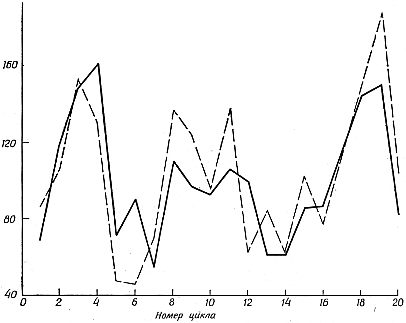
Fig. 1. A ratio between number of spots at the moment of a maximum of solar activity and angular separation between couples of planets Jupiter - Saturn (5,6) and Uranus - Neptune (7,8). A dashed line is a number of spots, solid line is a value |L8 - L7 | + |L6 - L5 |, where L is heliocentric longitude at the moment of a maximum [24].
Outstanding heliophysicist Theodor Landscheidt has approached more closer to the truth, opening a tight connection between solar activity and acceleration in motion of a barycenter of solar system [26-28] (see fig. 2). He has discovered, that exactly the maximum of acceleration of motion of a barycenter is a trigger mechanism of solar activity and has pointed on low development of the theory of physics of solar core.
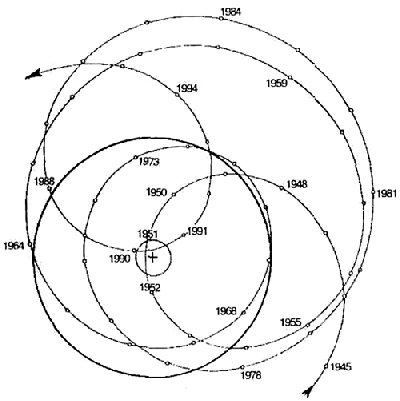
Fig. 2. The motion of the solar system barycenter for last half-century, Landscheidt, 1976, [26].
The tritium cycle of Sun
The deuterium, being a stable element is accumulated in solar atmosphere. The tritium also can be accumulated, if the speed of its production will be higher, than speed of natural decay and consumption for atomic explosions in thermonuclear reactions of fusion isotopes of hydrogen producing helium. The basic reaction is
2
D + 3T -> 4He + n + 17.6 MeVA half-life of tritium is 12.26 years
[29]. From here it is possible to make a conclusion, that at pulsive, that is simultaneous consumption of tritium, the following maximum of density will be occurred after 12±4 years in function of the rate of producing. That is a fact. The cycles of solar activity repeat through such intervals or fade for decades, while the conditions for their origin will not blossom yet, that is if the speed of accumulation of tritium will be lower than speed of its decay. One of such minima called by J. Eddy [30] “Maunder Minimum” having a place between 1645 - 1715, was discovered by J.R. Wolf in 1852 [31, 32] and explicitly described by H. Schpörer and E. Maunder [33].As is known [34], the climatologists call this time as a “small glacial epoch” or “Fernau Stage” (Tirol glacier), when global temperature has decreased almost on 1o.
Outgoing from the set up above reasons and facts the author has come to the following scheme of solar activity.
Once in 8 - 16 years near a surface of metasolid solar core the conditions of an initialization of nuclear reactions of synthesis of helium from a protium – deuterium – tritium mix arise. These conditions arise at the moment of the best emission of neutrons from metasolid core. In this moment many spontaneously divided isotopes of heavy elements which are creating conditions for chain nuclear reactions arise near the core. The concentration of tritium exceeds critical value necessary for origin of thermonuclear explosion.
The feature of process is that the basic DT-thermonuclear process is initiated by low-energy nuclear reactions of elements, saturated by neutrons, similarly nuclear fuse of a hydrogenous bomb. It is a substantially observable phase of fore-flare increase of activity “warming up” a place of the future TD-explosion. According to calculations of the author in the center of Sun in absence of explosions the temperature does not exceed 150000 oK [15].
Actually there is a series of large thermonuclear explosions provoking each other (see fig. 3).
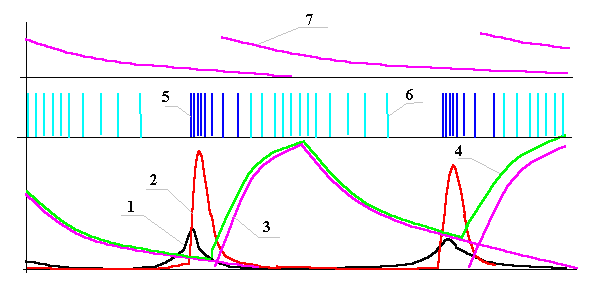
Fig. 3. “Tile” sequences of solar cycles.
( 1 - acceleration of metasolid core; 2 - general energy
of DT-atomic explosions, 3 – Wolf number of the given cycle, 4 - general Wolf number, 5 - deep magnetic storms with a sluggish start, 6 - surface magnetic storms with a sharp start, 7 - latitudinal drift of spots)For short period, much smaller the time of cycle of solar activity about a hundred large explosions 1030
- 1031 [J] happens. The general energy of these explosions usually makes value about 0.1 - 1% of the radiation energy of Sun. The solar constant varies on this value. Confirmation of that is the decrease of an insolation on value close to 1% during Maunder period of absence of solar activity.Each such explosion leaves after itself an impact cavity of rarefaction passing into a steady curl of ionized gas. When these curls leave on a surface of the Sun, we observed couples of spots - egresses of central tubes of curls.
Knowing rotation rate of the Sun, it is easy to calculate time of rise of these curls up to a surface. It makes 2 - 12 years depending on power generated by explosion.
The rotation of gaseous masses of solar atmosphere veers up-floating of curls, pushing them to solar equator. The most powerful curls mount faster and float up far from equators, up to 40o of a latitude. Smaller - in lower latitudes and later on several years. It is a substantially observable picture (see fig. 4).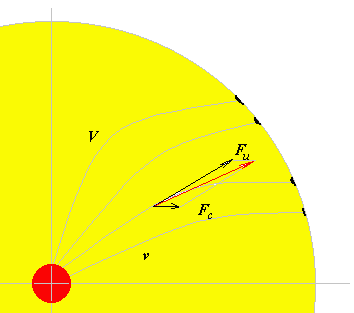
Fig. 4. The scheme of curls surfacing from entrails of the Sun.
( For large curls with a high speed of ascent
V the fleet angle to equator under operation of force of rotation Fc is small. For small curls with low speed of ascent v the drift to equator is great.)Thus counting of cycle of solar activity starts on decay of the previous cycle, when in the center of Sun there is a volley of thermonuclear explosions. The a spots of this cycle appear on a solar surface only after several years. The spots of last curls of the previous cycle may not reach a surface yet. So there is an superposition of cycles against each other by peculiar tile. It is an explanation of “butterflies” on the diagram of distribution of spots on a latitude and time (see fig. 5).
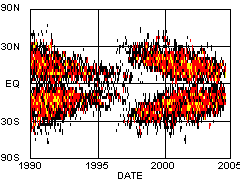
Fig. 5. The distribution of sun-spots on a latitude and time.
The evidences of deuterium – tritium fusion
Except for main powerful thermonuclear explosions near the solar core, there are sporadic thermonuclear explosions near solar surface. These explosions are provoked by curls raising from depths of the Sun, by capturing neutronization of material and thermodynamic cumulative processes in a borderline field of solar atmosphere. The energy of explosion reaches 1026
[J].For last decade with the help of neutron monitors - helium neutron sensors much data about neutron bursters happening after solar flares are accumulated. Such data collected not only from a surface of the Earth, but also at a great distance, for example, from Martian orbit, where these measurements are carried out by the American space apparatus “Odyssey” with the Russian sensor of neutrons HEND.
For example, in October 28, 2003 at 10:04 UT on the surface of Sun the flare - testimony of thermonuclear explosion has appeared. On the Earth the front of electromagnetic radiation has come after 8 minutes, that is at 10:12 UT. At 10:48 UT on the detector of a nuclear radiation in IZMIRAN – The Institute of Earth Magnetism of Russian Academy of Sciences, Troitsk the hits of neutron flow superiors background in 100 times (see, for example [35]). Thus time of neutron burster is observed after 48 minutes of powerful explosion in entrails of the Sun. Knowing this delay and distance from the Sun up to the Earth it is possible to determine speed of neutrons and, therefore their energy. This energy in accuracy corresponds to a thermonuclear fusion reaction of helium from deuterium - tritium mix.
We can find the maximum of speed of neutrons induced by DT-explosion by counting a difference between time of explosion and arrival time of a neutron flux front
|
V = S/(Tarriv - Tsource) = 1.49·1011/(48·60) = 5.8·107 [m/s] |
(1) |
From here we find out elementary a kinetic energy of neutrons of front
|
E = mV2/2 = 1.67·10-27·(5.8·107)2/2 = 2.8·10-12 [J] = 17.6 [MeV] |
(2) |
This energy in accuracy corresponds to energy of a neutron produced in a thermonuclear fusion deuterium and tritium.
Unfortunately, many authors, is groundless considering the birthplace of these neutrons a solar corona, receive the overstated values of energy of neutrons, having truncated transient time [35, 36]. Their calculations they can audit, having used the data of remote space apparatus, like “Odyssey” - HEND.
As many observations show, at once after a flash, which with all conspicuity is a sign of thermonuclear explosion, a shock wave arises.
The curls of atomic explosions essentially influence on dynamics of solar atmosphere. Changing distribution of density of solar atmosphere by replacement of gaseous masses from a core to peripherals, they inhibit directional motion of surface layers by increasing of a moment of inertia of the Sun. And on the contrary, when the nuclear activity is reduced, the solar rotation rate - directional motion of surface layers increases.
According J Eddy’s study [30] in Maunder period the solar rotation rate was higher on 4% than modern. Sakurai [37] has established, that relatively high speed of equatorial rotation of the Sun corresponds to small number of sun-spots.
The observable cycling change of solar diameter bears to this.
The origin of “solar wind”
The flow of high energy protons going from the Sun and reaching orbits of the outer planets, where it sinks as hydrogen, accumulating in atmospheres of these planets, is only neutron flux, emitted during DT-nuclear fusion on the Sun. As a life time of neutrons much more less, than time over up to the Earth (the mean speed of “solar wind” in quiet time is about 400±100 [km/s]), they reach the Earth as protons and electrons - the product of decay.
The small part of neutrons all the same overcoming distance up to the Earth, generates heavy isotopes, the hits of which density are watched in practice after each solar flare. Besides the heavy isotopes - products of atomic explosions reach from the Sun also.
As it is visible, the main part of protons coming to us from the Sun has a speed much below, than (1). That is because these nucleons (neutrons and product of their decay - protons) scattered repeatedly before embarkation from solar atmosphere with atoms of atmosphere, losing a kinetic energy. Using a level of this energy and a ratio of protons to neutrons reaching the Earth, it is possible to define a depth of DT-synthesis origin, and on total of particles - about power of process. Thus it is possible to have the full information on distribution of DT-explosions in time and space of solar entrails.
Apparently, that an initial source of these neutrons is solar metasolid core making capturing neutronization of solar atmosphere by origin the material excessive on neutrons, as tritium. The excess of neutrons after a number of nuclear reactions in solar atmosphere transforms to protons of solar atmosphere (about 99 %) and will be rejected abroad the Sun (about 1 %).
The order of part of DT-thermonuclear energy of the Sun can be estimated by value
Wfus / Wsun = Isw ·EDT · EeV·D/Wsun = 1.5·1011· 1.32·107·1.6·10-19·102/1.36·103=1%
where Isw – is average value of a protons flow on orbit of the Earth [p / s m2];
EDT - is an energy of DT-fusion [eV];
EeV - is the energy of 1 eV [J];
D – is a mean absorption coefficient of nucleons of TD-fusion in solar atmosphere [times];
Wsun – is the solar constant [J / s m2].
The origin of magnetic storms and solar magnetic field
Within the framework of the offered concept there is a simple explanation of solar magnetic phenomena. Thermonuclear DT-fusion happening in entrails of the sun, as well as the military hydrogenous explosion on the Earth, generates a powerful electromagnetic impulse by separation nuclei and electrons. Besides the shock wave blowing 50 % of an emission of nuclear explosion, will produce a large cavity. Two these phenomena in ionized gas generate a curl of plasma, very steady due to inertia of a magnetic field induced by motion of electric charges. Peculiar “globular lightning” slowly floats up on a surface of the Sun.
The birth of these electromagnetic curls causes a magnetic storm. If there is a derivation of curls on large depth of the Sun, their magnetic fields are essentially suppressed, but near solar core there are most strong explosions. Therefore we can watch magnetic storms made by them. Such storms differ by sluggish increase as they are echo of monstrous DT-explosions 1031 [J], when the masses of gas comparable with planetary masses are involved in operation in one curl.
The explosions near solar surface are much more of orders less (< 1026 [J]). Therefore magnetic storms induced by them, have sharp start and seem more powerful for terrestrial observers.
As is known, the magnetic storms with sluggish increase happen at the moment of decay of 11-year cycle of solar activity, that is at the moment of main 102 TD-explosion near solar metasolid core. Several years later these explosions appear for a terrestrial observer as 102 main couples of spots (Wolf groups). The maximum of frequency of magnetic storms with a sharp start is necessary on peak of the active sun and is connected to near-surface explosions, the flares from which are often observable from the Earth.
The power and the 22-year cycle of solar magnetic field also are easily explained within the framework of the offered concept. The twist of electromagnetic nuclear curls is determined by initial at present time direction of the field and is synangular for all curls. The initial direction is determined by a place of initiation explosions of cycle. As after each series of explosions gas medium in a hemisphere of preferential origin of explosions rarefying in tritium and deuterium, the next time series of explosions happens in the other hemisphere, and, in connection with opposite operation of solar rotation the new rotation of curls happens in other direction. The close to a 22-year normally - ecliptic disturbance on a barycenter of a solar system from planets contributes its influence to this process also.
Acknowlegment
The author is grateful to professor F. Winterberg (University of Nevada, USA), engineer of the exploratory nuclear reactor of the National Nuclear Centre of Kazakhstan N. K. Noskov and engineer J. Kern (Stuttgart, Germany) for discussion considered in present paper problems and moral support.
Conclusions
As a result of the research, carried by the author, the actual nature of solar activity is clarified:
References
Karim Khaidarov
Borovoye, November 25, 2004.